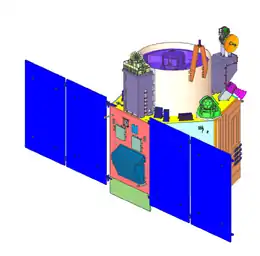Cartosat-3
Cartosat-3 is an advanced Indian Earth Observation satellite built and developed by ISRO, which will replace the IRS series. It has a panchromatic resolution of 0.25 metres making it the imaging satellite with highest resolution in the world and Mx of 1 metre with a high quality resolution which is a major improvement from the previous payloads in the Cartosat series.[3][4][5]
 Render of Cartosat-3 satellite in deployed configuration | |
| Mission type | Earth observation |
|---|---|
| Operator | ISRO |
| COSPAR ID | 2019-081A |
| SATCAT no. | 44804 |
| Website | www |
| Mission duration | Planned: 5 years Elapsed: 1 year, 2 months, 3 days[1] |
| Spacecraft properties | |
| Manufacturer | ISRO |
| Launch mass | 1,625 kg (3,583 lb)[2] |
| Power | 2000 watts[2] |
| Start of mission | |
| Launch date | 27 November 2019, 03:58 UTC 09:28 IST[1] |
| Rocket | PSLV-XL C47[1] |
| Launch site | Satish Dhawan SLP[1] |
| Contractor | ISRO |
| Orbital parameters | |
| Reference system | Geocentric |
| Regime | Sun-synchronous[1] |
| Periapsis altitude | 509 km (316 mi)[1] |
| Apoapsis altitude | 509 km (316 mi)[1] |
| Inclination | 97.5°[2] |
Cartosat series | |
Potential uses include weather mapping, cartography or defence, and strategic applications.[6]
Overview
Cartosat-3 has a resolution of 25 cm (10").[7] It uses 1.2 m optics with 60% of weight removal compared to Cartosat-2. Other features include the use of adaptive optics, acousto optical devices, in-orbit focusing using MEMs and large area-light weight mirrors and advanced sense with a high quality resolution.[8] It has a planned mission life of 5 years.[9]
History
Cartosat-3 is the 3rd generation of high-resolution imaging satellites developed by ISRO.[10] It was developed in response to increased demand for imaging services to address urban planning, rural resource and infrastructure development needs.[11]
Launch

PSLV C47 carrying Cartosat-3 was launched on 27 November 2019 at 03:58 UTC using XL variant of Polar Satellite Launch Vehicle from the second launch pad of Satish Dhawan Space Centre into a sun synchronous orbit of 509 kilometers. Thirteen commercial ride-sharing 3U cubesats including twelve SuperDoves (Flock 4p)[12] by Planet Labs and one Meshbed by Analytical Space of United States were also put in orbit using the same launch vehicle.[9][13] Commercial ride-share was arranged by New Space India ltd, Spaceflight industries and ISILaunch.[14][15]
See also
References
- "Press Release - PSLV-C47 successfully launches Cartosat-3 and 13 Commercial nanosatellites into Sun Synchronous Polar Orbit". Archived from the original on 27 November 2019. Retrieved 27 November 2019.
- "PSLV C47/Cartosat-3 Mission Launch Kit" (PDF). Archived from the original (PDF) on 19 November 2019. Retrieved 27 November 2019.
- Prasad, Narayan. "Cartosat-3 in space — here is how ISRO can now exploit its full potential". ThePrint. Retrieved 2 December 2019.
- "ISRO: ISRO reschedules CARTOSAT 3 launch to November 27". m-economictimes-com.cdn.ampproject.org. Retrieved 23 November 2019.
- "Isro's Cartosat-3 launch next week - ETtech". ETtech.com. Retrieved 23 November 2019.
- Prasad, Narayan. "Cartosat-3 in space — here is how ISRO can now exploit its full potential". ThePrint. Retrieved 2 December 2019.
- N. Gopal Raj. "ISRO plans a new high-resolution earth satellite". The Hindu. Archived from the original on 19 January 2018. Retrieved 19 January 2018.
- Current Science, Vol. 93, no. 12, 25 December 2007, page 1729.
- "ISRO's tracking centre assumes control of CARTOSAT-3". The Hindu. PTI. 27 November 2019. ISSN 0971-751X. Retrieved 27 November 2019.CS1 maint: others (link)
- "PSLV-C47 / Cartosat-3 Mission".
- "Cartosat-3".
- "12 SuperDove Satellites Hitching a Ride to Orbit on the PSLV". Retrieved 27 November 2019.
- Clark, Stephen. "PSLV delivers India's highest-resolution Earth observation satellite to orbit – Spaceflight Now". Retrieved 27 November 2019.
- "Successful ISILAUNCH29 campaign". ISILAUNCH. 27 November 2019. Retrieved 27 November 2019.
- "Getting Meshbed to Space!". Spaceflight. 14 October 2019. Retrieved 27 November 2019.
